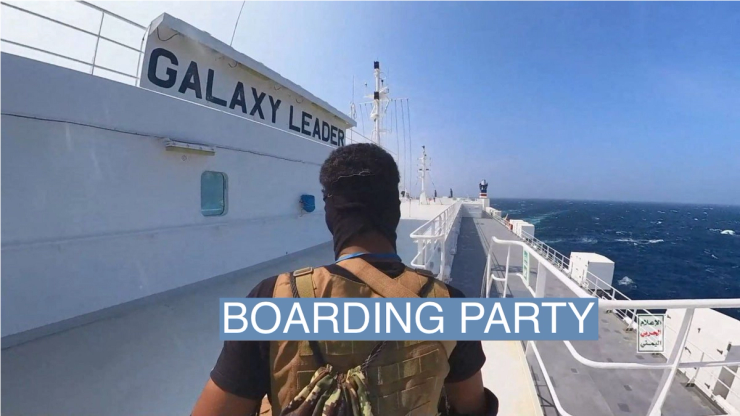The Scoop
The Pentagon is deliberating whether to directly strike Houthi rebel military targets in Yemen in response to the Iranian-backed militia’s escalating attacks on military and commercial shipping in the Red Sea.
Biden administration officials told Semafor they’re increasingly concerned that the Houthis, and their sponsors in Tehran, are trying to undermine global maritime trade, both to undercut trade to Israel and to raise the costs to the U.S. and its allies for supporting the Jewish state’s now 11-week war in Gaza against the Palestinian militant group Hamas. Already, some global shipping lines are diverting their cargo traffic away from the Red Sea and Suez Canal to routes circling the Horn of Africa, which significantly increases transit times and costs.
But U.S. officials say they’re weighing a strike on the Houthis against their fears of potentially fueling a broader war against Iran and its proxies. Biden administration officials have repeatedly said their priority is keep the Middle East conflict solely focused on backing Israel’s campaign to dislodge Hamas from its base in Gaza, though they haven’t ruled out more aggressive military operations. Iranian-backed militias have also launched dozens of attacks on U.S. military bases in Iraq and Syria over the past two months.
“As we’ve demonstrated in the past… our military will not hesitate to take action where we deem it necessary and appropriate, including to protect against actions in the maritime domain that could threaten our troops,” Pentagon spokesman Gen. Patrick Ryder said in Washington this week in reference to the Houthi attacks.
U.S. and allied forces have intercepted Houthi missiles and attack drones in recent weeks that the Pentagon believes were targeting Israel. The Yemeni army has vowed to militarily back Hamas following its October 7 attack on Israel. And the Houthis have widened their campaign to target commercial ships that the militia alleges were heading towards Israeli ports.
On Tuesday, the Houthis struck a Norwegian-flagged tanker, the Strinda, with a cruise missile. Last month, they seized a cargo ship allegedly partly owned by an Israeli businessman and took its 25-person crew captive. “If Gaza does not receive the food and medicine it needs, all ships in the Red Sea bound for Israeli ports, regardless of their nationality, will become a target for our armed forces,” Houthi spokesman Yehia Sareea told Yemeni television this week.
The U.S. has deployed two carrier strike groups to the Mideast since early October and has the assets to target Houthi missile batteries and radar systems inside Yemen. But so far, the Pentagon has stood down due to these fears of escalation, according to U.S. officials. The U.S. hasn’t directly attacked Houthi military positions in Yemen since 2016, when the Pentagon destroyed one of the militia’s coastal radar installations using Tomahawk missiles in response to attacks on U.S. naval ships.
The Pentagon’s deliberations on the Houthis are occurring as U.S. officials seek to widen the numbers of countries participating in a maritime coalition, called Combined Task Force 153, which is charged with policing the Middle East’s key waterways and choke points — including the Straits of Hormuz and Bab el-Mandeb strait.
In this article:
Jay’s view
The Houthi attacks are part of what a number of current and former U.S. defense officials describe as an undeclared war launched by Iran through its allies since October 7. The question remains if the Biden administration sees it as in Washington’s interest to strike back.
Tehran has spent decades building out a regional network of militias, aligned governments and military proxies – known as the Axis of Resistance – to contest U.S. military dominance in the Persian Gulf and other Mideast theaters. In past years, Iranian-backed Hezbollah has attacked U.S. military and diplomatic compounds in Lebanon. And Iraqi militias, with Tehran’s support, mastered the roadside bombs that killed hundreds of U.S. and Iraqi servicemen and women following the fall of Saddam Hussein. But fallout from the war in Gaza is allowing Iran to showcase the full extent of its region-wide capabilities.
“There is something close to an undeclared war between Iran and the United States, when it comes to the attacks and the reprisals that are going on outside of Israel,” retired Lieutenant General Michael Nagata, who oversaw U.S. Special Operations forces in the Middle East during the Obama administration, said this week. “This is a dangerous development. I don’t think there’s any way of predicting where this is going to go at this point.”
Tehran has specifically focused on growing its alliance’s military capabilities in the region’s strategic waterways. Going back to the 1979 revolution in Tehran, the Islamic Republic has developed naval, drone, and missile capabilities to allow it to harass U.S. naval forces and oil tankers transiting through the Persian Gulf. And now it’s essentially transferred the same capabilities to the Houthis in the Red Sea.
This gives Iran enormous influence over two of the world’s most important commercial choke points, the Strait of Hormuz and the Bab el-Mandeb strait. Many former defense officials believe the U.S. has no choice but to strike the Houthis in order to keep global commerce flowing. “I don’t think we’re going to be successful until we start imposing costs ashore for the Houthis,” said retired Admiral John Miller, who oversaw U.S. naval forces in the Mideast.
Room for Disagreement
Despite these stakes, Nagata and a number of current and former U.S. defense officials warned the U.S. and its allies face major risks if they strike against the Houthis and other Iranian allies. Tehran has cultivated and built assets in so many Mideast countries that they could retaliate in multiple theaters at once. “Is this a moment where we can clip Iran’s wings or push them back strategically? Nagata said. “Our timing is awful, because, in my humble opinion, Iran is in the strongest strategic position, I think they’ve probably ever been in, since the revolution.”
Iran’s defense minister warned the U.S. and its allies against growing their naval presence in the Persian Gulf and Red Sea and expanding the activities of Task Force 153. “Nobody can make a move in a region where we have predominance,” Mohammad Reza Ashtiani told Iranian state media on Thursday.
Notable
– Axios reported on Thursday that the U.S. sent messages to the Houthis via third parties warming against continued attacks in the Red Sea.
– German shipping giant Maersk suspended its Red Sea route after two more Houthi attacks.
-“The Houthis have two goals in conducting these attacks: one domestic and one international,” write the Yemen expert Gregory Johnsen. They are “are hoping to offset growing signs of domestic discontent by rallying Yemenis under their rule around a common foe” as well as “looking to provide some political cover for Iran.”


